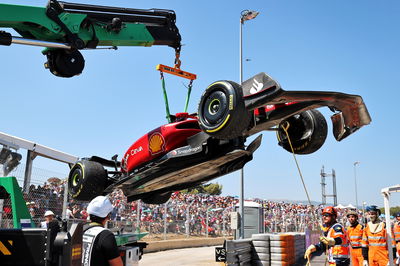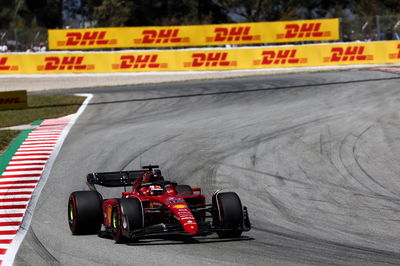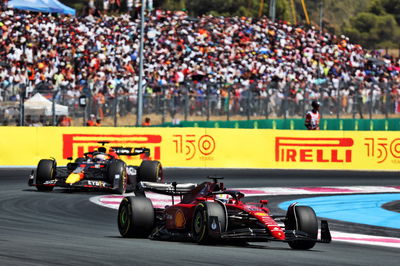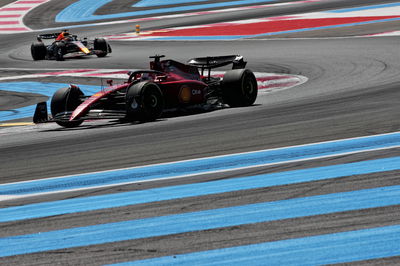F1 TECH - Is Ferrari’s upgraded floor the indirect cause of Leclerc’s DNF?

Since the season-opening Bahrain Grand Prix, Ferrari’s 2022 challenger proved to be very strong in qualifying, where the true performance of a car is shown, but often showed weakness on race day, especially with tyre management, efficiency at high-speed and porpoising.
Throughout the season, Ferrari’s engineers back at Maranello understood the weak points of the F1-75 and thus introduced upgrades in the subsequent races after Bahrain.

Tyre management was improved with the introduction of a new floor in Spain, while its efficiency on the straights was solved with a new rear wing in Montreal.
- The truth behind Leclerc’s stuck throttle radio message
- Was Sainz’s strategy another Ferrari ‘disaster’ at French GP?
- Leclerc: I don’t deserve to win F1 title with ‘unacceptable’ mistakes
Finally, the porpoising problem was rectified with Ferrari’s latest floor upgrade at the French Grand Prix.
Assessing Ferrari’s latest upgrade, it was characterised by a bigger section of the first part of the venturi’s tunnel, able to increase the amount of air under the car, in order to create more downforce and eradicate the porpoising effect.
However, a floor that generates more downforce gives the potential to drive with a higher minimum speed than a car with less downforce - like the Red Bull.
More speed means more energy on the tyres, combined with the higher track temperatures at the Circuit Paul Ricard, front tyre degradation was going to be an issue for cars with more downforce such as Ferrari.

For this season, at Paul Ricard, Ferrari were forced to adopt a particular set-up on their cars, with a very strong front-end (to avoid understeer and not generate high temperatures on the front tyres) and a lazy rear, thus creating more oversteer that had to be managed by the drivers.
The setup created some difficulties for Charles Leclerc in the opening laps of the race but later allowed him to manage the tyres better than the Red Bulls - Sainz’s recovery drive also showed this - and to open a gap up to Verstappen at the end of the first stint, even with worn medium tyres.
Verstappen pitted at the end of Lap 16 as Red Bull tried to undercut Leclerc, forcing the Ferrari driver to push for the subsequent two laps.
Looking at the gap, Leclerc would have likely lost the lead had he stopped at the end of Lap 18 but it was too late as he lost control of his car at Turn 11, the long-right-hand corner after Signes, ending in the barrier.

Reflecting on the crash itself, it’s possible to see that in the first part of the corner, Leclerc managed to take it with a very pointed front end but through the corner, the lazy rear didn’t follow it and thus there was a huge oversteer moment for him that he wasn’t able to control, crashing into the barriers as a result.
Of course, it is really difficult to say what are the real reasons for the crash, even if it’s quite clear that it was just caused by a human mistake, admitted by Leclerc himself afterwards.
Analysing the Ferrari onboards in the first part of the race, we can safely say the behaviour of the F1-75 didn't help Leclerc avoid a tragic end to the French GP.
While the link might not be direct, could it be possible to say that Leclerc’s crash may have been indirectly caused by Ferrari’s new upgrades?
![Toprak Razgatlioglu, ROKiT BMW Motorrad, BMW M 1000 RR [Gold & Goose]](https://cdn.crash.net/2024-09/GnG_1165424_HiRes.jpg?height=90)






![Johann Zarco, LCR, Honda RC213V, 2024 San Marino MotoGP, Misano, action [Gold & Goose]](https://cdn.crash.net/2024-09/GnG_1166323_HiRes.jpg?height=90)

![Jack Miller, KTM Factory Racing, KTM RC16, San Marino MotoGP, Misano, action [Gold & Goose]](https://cdn.crash.net/2024-09/GnG_1167624_HiRes.jpg?height=90)